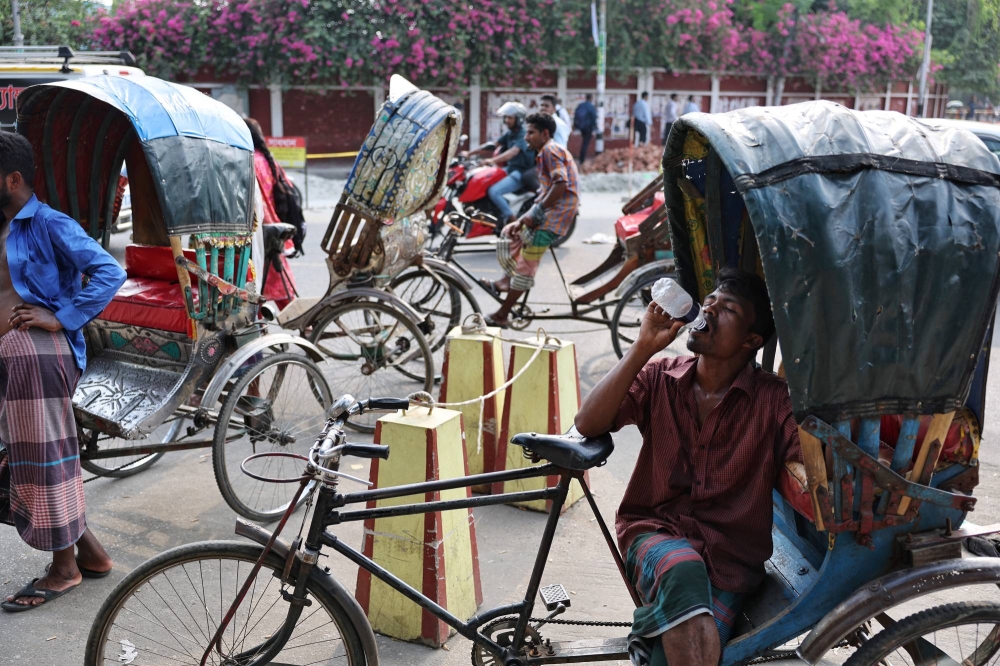Religious scholars in Bangladesh say the country should harness the generosity of Muslims around the world and use their charitable giving to help the country adapt to climate change.
They said global faith-based finance could be a crucial way to support poor countries whose needs for funds to adapt to climate change are 10 to 18 times greater than the financing they currently receive.
“Being good to others as well as the environment is seen as integral to being a good person in Islam,” said Md Riaz Uddin, an Islamic scholar and human rights activist from Bangladesh who is the head of Boroikandi Madrasa, a religious seminary.
Riaz Uddin said there were different forms of charity that were either obligatory or voluntary for Muslims, but all could be used to support people who were destitute, or were exposed to serious risks due to climate change and natural disasters.
Zakat — giving to the poor and needy mandated by Islam — in Bangladesh alone has the potential to raise close to $9.8 billion, according to a study last year.
Bangladesh needs about $9 billion a year for climate adaptation, Environment, Forest and Climate Change Minister Saber Hossain Chowdhury said last month.
Giving zakat is mandatory for all Muslims with wealth above a certain threshold in order to support the poor, the debt-ridden, or people migrating with limited resources.

A man sleeps under a tree during a region-wide heat wave in Dhaka, Bangladesh, on Sunday.
| REUTERS
In Bangladesh, people mostly give informally and as they see fit — often handing out clothes to poor relatives, or people in the neighborhood. Riaz Uddin said that had limited long-term impact on the lives of the beneficiaries.
Zakir H Khan, chief executive of the Dhaka-based research organization Change Initiative, has studied the potential of Islamic charity for financing climate action. He said that given the amount of money donated every year, better coordination would do more to help the most climate-vulnerable groups.
“Instead of using the charity money for one-off do-gooding, the money could be pooled together and used in a planned way to transform the lives of climate survivors,” Khan said.
Clean water
Some organizations are already using zakat to adapt to climate change.
Wateraid, an international non-governmental organization, focused on water, sanitation and hygiene, is using Islamic charitable donations to build water solutions for salinity-affected communities in countries in the global south that have large Muslim populations such as Bangladesh, Pakistan and Mali.

A child playfully takes a dip in a lake to get respite from the heat on a summer afternoon in Dhaka on Monday..
| AFP-JIJI
“We raise a lot of zakat money from countries like the U.K. to help communities at the front line of the climate crisis,” said Hasin Jahan, Wateraid’s Bangladesh country director.
On the southwest coast of Bangladesh for example, religious schools struggle to provide clean drinking water to students as there is little funding to address issues such as the growing salinity of the water, which is made worse by climate change.
Wateraid focuses on girls and young women in these areas whose needs are often neglected.
“Salt-free drinking water at school is a relief — and on top of that we get free sanitary pads to protect our health,” said Suraiya Khatun, a 15-year-old student in the region.
Islamic schools teach about 2.8 million children in Bangladesh. They are now seeking international religious donations to tackle growing heat, salinity and other climate-related hazards that increasingly impact students’ health.
Religious scholars agree
One country that has made progress in using Islamic charity for climate action is Indonesia — a nation that needs $323 billion to meet its climate targets by 2030.
Indonesia’s council of religious scholars this year issued rulings on how zakat could be used to build water facilities, or endow trusts with land or money to plant more forests.
There have been debates about using Islamic charity for meeting climate needs, but religious scholars and finance experts are converging on the conclusion that it can be used.
“We hope that people will now have clarity that the religious scholars agree that climate change is real and our scriptures teach us to protect the people’s future,” said Hayu Prabowo, chairman of the Environment and Natural Resources Body at the Indonesian Ulema Council, made up of Indonesia’s top Islamic scholars.
World Bank estimates show zakat financing could range from 1% to more than 4% of the gross domestic product of Muslim countries such as Bangladesh, Indonesia or Sudan — which could act as a social safety net for the poor and vulnerable.

Muslims perform a special prayer for rain on the streets during a region-wide heat wave in Dhaka, Bangladesh, on Tuesday.
| REUTERS
Faith-based climate finance needs to choose the right mix of tools and technology to meet the needs of beneficiaries, said Prabowo who is also a trustee of Faithinvest, a network of impact investors from different religious groups.
For example, zakat can only be used to help poor Muslims, but other forms of giving such as sadaqah, which is purely voluntary, can support people of any faith. A third mode of funding called waqf can be provided to institutions for long-term investment.
A range of organizations, including Wateraid, are tapping into sadaqah funding, while Indonesia is using “green waqf” endowments to create forests on degraded land.
Technology is key at every stage of the faith-based financing process, from raising money to implementing projects and ensuring trust in the process, Prabowo said.
Organizations like Wateraid are raising zakat donations online, while Indonesian scholars are working towards using blockchain technology to allow people to see where their money is spent.
“Faith-based charity has enormous potential to drive climate action — and with more and more good examples on the ground, I hope faith-based climate finance will gain more momentum,” said Prabowo.

